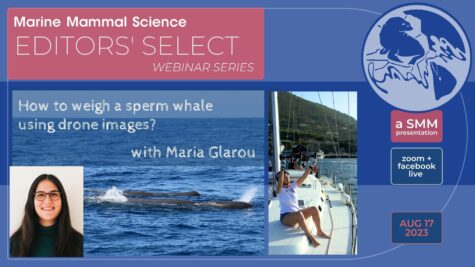
You are invited to the next edition of the SMM Seminar Editor’s Select Series Webinar. This series highlights the latest and most exciting marine mammal science published in the Marine Mammal Science Journal. The SMM created this series to give scientists and citizens around the world a chance to engage with marine mammal scientists, learn, and ask questions. All are welcome!
Join us on Thursday, 17 August 2023 at 7 am PDT / 10 am EDT / 2 pm GMT
for the next SMM Seminar Editors’ Select Series Webinar:
How to weigh a sperm whale using drone images? with Maria Glarou
This event was recorded live and published on youtube: https://youtu.be/bJO0RQK0EJs
For future events, please check our news room or join the SMM Facebook page.
About this talk:
Body mass is a fundamental characteristic of animals. Although sperm whales (Physeter macrocephalus) are the largest toothed predators on earth, body mass is seldom included in studies of their ecology and physiology due to the inherent difficulties of obtaining direct measurements. We used drone images to estimate the weight of free-ranging sperm whales. We collected aerial images of 102 sperm whales (of all reproductive classes) in the Eastern Caribbean and Mediterranean Sea during 2017–2020. First, we obtained body length, width, and height (at 5% increments) measurements from dorsal and lateral drone images. Based on these measurements, we then created an elliptical 3D body shape model to calculate the body volume of the animals. We used 4 different approaches to convert volume to mass: tissue-density estimates from catch data, animal-borne tags, and body-tissue composition. Our results showed that the average total body density ranged from 834 to 1,003 kg/m3, while the weight predictions matched with existing measurements and weight-length relationships described in previous research. Our body-mass models can be used to study sperm whale bioenergetics, including inter- and intra-seasonal variations in body condition, somatic growth, metabolic rates, and cost of reproduction.
About the presenter:
Maria Glarou is originally from Greece. She holds a BSc degree in Biology from the University of Patras (Greece), and is a MSc graduate from Stockholm University (Sweden) with a degree in Marine Biology. Her main research interests revolve around cetacean bioenergetics, ecology and ecophysiology, as well as the impacts of human disturbance on cetaceans. For her MSc project, she conducted a pilot study in the Eastern Mediterranean Sea, exploring small-scale fisheries interactions with small marine mammals. She is currently a PhD fellow at the University of Iceland’s Research Center in Húsavík, where she studies the allometry of physiological and behavioural thermoregulatory adaptations of different-sized cetaceans in Skjálfandi Bay, NE-Iceland.
Open access to this article is made temporarily available in the weeks around the presentation and can be found here. Current SMM members have access to all Marine Mammal Science papers.
Missed a presentation or want to share this series with a friend? All previous Editors’ Select presentations are recorded and archived on our YouTube channel here: https://www.youtube.com/playlist?list=PLUc78IynQlubS2DVS1VZoplf_t42-yZOO